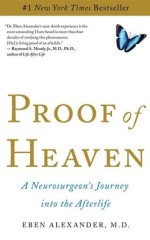This quote by Raymond A. Moody Jr. M.D. Ph.D., author of Life After Life, made me pick up Eben’s Alexander’s M.D. Proof of Heaven:
“Dr. Eben Alexander’s near-death experience is the most astounding I have read in more than four decades of studying this phenomenon. [He] is living proof of an afterlife.”
As near-death-experience (NDEs) stories go, Dr. Alexander’s sure is different than the rest. Unlike others who have experienced NDEs, his neocortex was not “temporarily inactivated” – instead it was completely “out of the picture.” As he puts it, “I was encountering the reality of a world of consciousness that existed completely free of the limitations of my physical brain.” Because of this, he believes he was able to “travel deeper” in his NDE “than almost all NDE subjects” before him.
This is an amazing story of how he “contracted a rare case of E. coli bacterial meningitis that no one could explain the origins of” (the first of its kind in medical history), what happened to him while he was “conscious in another dimension” for a week while in a coma, and how he captures his experience after the mystery of his complete recovery.
The chapters flow from what was happening in earth-based reality while he was in a coma to chapters describing his experience of another, “ultra” reality. A scientist writing from his heart, he convincingly explains how there’s the “sheer, flat-out impossibility of arguing from a medical standpoint,” that what happened to him in that other dimension could have been all fantasy. He makes this conclusion based on medical analysis of his experience, and his knowledge of the “most advanced concepts in brain science and consciousness studies.” With his scientist hat on, he gives nine hypotheses that could account for his experience, and lays out how all fail to explain it.
Before his NDE, in his words, he really did not believe that “something of us survives the death of the body.” In Proof of Heaven we learn how far from this position he has come, and why he feels he has been “privileged to understand that our life does not end with the death of the body or brain.”
Alexander still feels that there is a considerable “chasm between our current scientific understanding of the universe and the truth” as he saw it – He still loves physics and cosmology, and still loves “studying our vast and wonderful universe,” but now, he has a “greatly enlarged conception of what ‘vast’ and ‘wonderful’ really mean.”
And in that vast and wonderful is “God.” He uses this word more conceptually, and refreshingly does not attach it to a particular kind of religion. This also goes for his use of the word “heaven,” which is not necessarily interpreted through a Christian lens.
In that vast and wonderful are also our “true, spiritual selves.” But we don’t need to wait until the afterlife to find that spiritual self – Alexander leaves us with ways we can get closer to that genuine spiritual self now, here on earth.
Throughout the book, you can feel how much Alexander wants us to understand there is an afterlife – that death is “not the end of personal existence but only a transition.”
It’s an undeniably amazing story of one man’s journey to living true – in his case, being truly compelled to share his encounter with deeper realms of existence.
An excellent addition to the Spirituality Book shelf of your LiveTrue collection!






